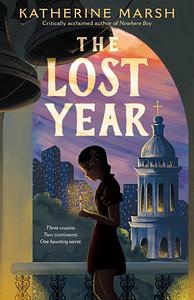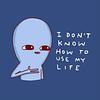Take a photo of a barcode or cover
It's a fascinating book, especially in the beginning, where it shows the power and the danger of propaganda, and yet indulges itself in a little propaganda of its own. But since it's mostly harmless, tangential to the story generally, and the way things really were then, I'll let it slide.
Overall the framing of the story is a really fascinating one, and I think it serves the story really well. I don't think I'd be interested in sitting down to read a "covid story" but I'm also unlikely to read a fiction account of Holodomor at the moment. And somehow those two hesitancies combined into a really beautiful narrative in this book. I feel like I should say more about it, but I can't think of anything else without going into specifics and being here for hours. It's just really lovely and I appreciate it a lot.
Overall the framing of the story is a really fascinating one, and I think it serves the story really well. I don't think I'd be interested in sitting down to read a "covid story" but I'm also unlikely to read a fiction account of Holodomor at the moment. And somehow those two hesitancies combined into a really beautiful narrative in this book. I feel like I should say more about it, but I can't think of anything else without going into specifics and being here for hours. It's just really lovely and I appreciate it a lot.
dark
emotional
informative
medium-paced
Plot or Character Driven:
Plot
Strong character development:
Yes
Loveable characters:
Yes
Diverse cast of characters:
No
Flaws of characters a main focus:
No
So not only did this book do a good job of paint what Covid was like, but it also captured the misinformation of the USSR and the tragedies USSR citizens lived through in the 1930s. As well as being well historically based, this book is also a good parallel between the current Russia and Ukraine conflict.
Throughout the book I had issues distinguishing if GiGi was Nadia or Mila. Mostly because the plot seemed to rotate around Nadia but was told through Mila’s eyes. By the end I understood and wow it was powerful.
I think this book can be a powerful tool for teaching middle grade kids about a time frame and geo political issues that are not well known in the US.
And I loved that while a work of fiction, a lot of the author’s own family history made it into and influenced the book.
Throughout the book I had issues distinguishing if GiGi was Nadia or Mila. Mostly because the plot seemed to rotate around Nadia but was told through Mila’s eyes. By the end I understood and wow it was powerful.
I think this book can be a powerful tool for teaching middle grade kids about a time frame and geo political issues that are not well known in the US.
And I loved that while a work of fiction, a lot of the author’s own family history made it into and influenced the book.
challenging
emotional
informative
medium-paced
Plot or Character Driven:
A mix
Strong character development:
Yes
Loveable characters:
Yes
Diverse cast of characters:
Complicated
Flaws of characters a main focus:
No
It's a pandemic book, but it's also a historical fiction book about the Ukrainian famine that was inflicted on the Ukrainian people by Stalin's regime. The voices of all the tween characters current and historical feel authentic. Matthew's obsession with the Legend of Zelda, Mila and Helen's behaviors as tweens in the 1930's New York and Kyiv are believable, to the point of making an adult want to roll their eyes. The growth of all of these tweens during the story is pleasurable to watch.
challenging
emotional
informative
medium-paced
Plot or Character Driven:
A mix
Strong character development:
Complicated
I had mixed feelings on this! One major thing is that I didn't really like the frame story, especially for the first half or so. I will admit that maybe kids are ready for (and in need of!) Covid Books, but I am just really not. It's all still very recent and honestly ongoing, and it's not something I really want to experience through fiction, especially in reductive (though thankfully not cruel) ways.
But again, the needs of modern kids who experienced what Matthew did instead of the Adult Version may find important representation in his struggles, which also become deeper as the book progresses.
I was drawn to this book because of the inclusion of the holodomor, something I'm still shocked I didn't learn about until my junior year of college. It's especially timely with the ongoing invasion of Ukraine and the similar tactics being employed as far as the full-scale attack on Ukrainian culture and identity (this book addresses mainly the famine, but learning about the famine is an important element in understanding Russian/Ukrainian relationships).
One element I'm quite impressed with is how it resolved what I saw as a POV problem through much of the book. It is clever and heartbreaking, and I think goes deeper into the emotional and thematic resonance at work. It also would make for intriguing rereads.
Occasionally I found the opinions of the various main characters a little on the nose, and the characterization of some adults as very one note. Some of the story resolutions helped, though did not always solve, these issues.
So overall I think I see it as a flawed, but not bad, book about a very important and unknown historical event, with a strong emotional throughlines and several compelling characters.
But again, the needs of modern kids who experienced what Matthew did instead of the Adult Version may find important representation in his struggles, which also become deeper as the book progresses.
I was drawn to this book because of the inclusion of the holodomor, something I'm still shocked I didn't learn about until my junior year of college. It's especially timely with the ongoing invasion of Ukraine and the similar tactics being employed as far as the full-scale attack on Ukrainian culture and identity (this book addresses mainly the famine, but learning about the famine is an important element in understanding Russian/Ukrainian relationships).
One element I'm quite impressed with is how it resolved what I saw as a POV problem through much of the book. It is clever and heartbreaking, and I think goes deeper into the emotional and thematic resonance at work. It also would make for intriguing rereads.
Occasionally I found the opinions of the various main characters a little on the nose, and the characterization of some adults as very one note. Some of the story resolutions helped, though did not always solve, these issues.
So overall I think I see it as a flawed, but not bad, book about a very important and unknown historical event, with a strong emotional throughlines and several compelling characters.
Moderate: Child death, Genocide, Pandemic/Epidemic
emotional
informative
mysterious
sad
medium-paced
Plot or Character Driven:
Character
Strong character development:
Yes
Loveable characters:
Yes
Diverse cast of characters:
No
Flaws of characters a main focus:
Complicated
medium-paced
adventurous
challenging
emotional
hopeful
informative
inspiring
reflective
sad
tense
medium-paced
Plot or Character Driven:
Character
Strong character development:
Yes
Loveable characters:
Yes
Diverse cast of characters:
Yes
Flaws of characters a main focus:
Yes
The story tackles several topics such as propaganda, separation and more. It talks about how propaganda was used during the USSR and how affected several people and how propaganda is still being used today. It captured the aspect of covid. The way it switched back and forth between them was a little confusing for me but it was enjoyable book.
emotional
hopeful
informative
inspiring
reflective
medium-paced
Plot or Character Driven:
Character
Strong character development:
Yes
Loveable characters:
Yes
Stories with alternating timelines are hit or miss for me, but Katherine Marsh is an author whose books have been on my To Be Read list for a long time. That plus the Kyiv setting and rarely explored place/time in history made this book too good to pass up.
It took me a couple chapters to feel like I found my footing in the story. Matthew, our present-day main character, is chafing at the isolation and boredom of the early days of the Covid-19 pandemic. Because his family cares for his 100-year-old great grandmother, they stay isolated from the community.
He ends up tasked with helping his great grandmother (GG) sort through some old papers and files. Through this, he discovers a family history he’d known nothing about. Two point-of-view characters from the past, cousins Mila and Helen, reveal the story of the Holodomor, the terrible famine that devastated Soviet Ukraine.
From there, I felt like the pacing of the story picked up, and the connections between the past and present helped to fuel the forward momentum of the story. Matthew’s dad is a journalist reporting on the pandemic from France. He and Matthew discuss the (awful) power of misinformation. They talk about how people can continue to believe falsehoods even as their friends and neighbors experience tragedy.
Just as in the past, Mila at first refuses to believe that her country is experiencing a preventable famine that has already killed thousands.
I thought the way Matthew’s relationship with GG develops and his budding interest in history and writing were really cool elements of the story. I loved that even in that, he shared a connection with Helen, his great-great-great-aunt(??) from the 1930s.
Altogether, I felt like the past and present timeline intersected at just the right moments. It shared themes that built on each other in powerful ways. I loved the introduction to a part of history that isn’t frequently explored, and the connection to the battle against misinformation we still face today.
Note: I received a free copy of this book in exchange for my honest review. Review will post to my blog on 1/18/23.
It took me a couple chapters to feel like I found my footing in the story. Matthew, our present-day main character, is chafing at the isolation and boredom of the early days of the Covid-19 pandemic. Because his family cares for his 100-year-old great grandmother, they stay isolated from the community.
He ends up tasked with helping his great grandmother (GG) sort through some old papers and files. Through this, he discovers a family history he’d known nothing about. Two point-of-view characters from the past, cousins Mila and Helen, reveal the story of the Holodomor, the terrible famine that devastated Soviet Ukraine.
From there, I felt like the pacing of the story picked up, and the connections between the past and present helped to fuel the forward momentum of the story. Matthew’s dad is a journalist reporting on the pandemic from France. He and Matthew discuss the (awful) power of misinformation. They talk about how people can continue to believe falsehoods even as their friends and neighbors experience tragedy.
Just as in the past, Mila at first refuses to believe that her country is experiencing a preventable famine that has already killed thousands.
I thought the way Matthew’s relationship with GG develops and his budding interest in history and writing were really cool elements of the story. I loved that even in that, he shared a connection with Helen, his great-great-great-aunt(??) from the 1930s.
Altogether, I felt like the past and present timeline intersected at just the right moments. It shared themes that built on each other in powerful ways. I loved the introduction to a part of history that isn’t frequently explored, and the connection to the battle against misinformation we still face today.
Note: I received a free copy of this book in exchange for my honest review. Review will post to my blog on 1/18/23.
reflective
sad
Plot or Character Driven:
A mix
Strong character development:
Yes
Loveable characters:
Complicated
Diverse cast of characters:
No
Flaws of characters a main focus:
No







